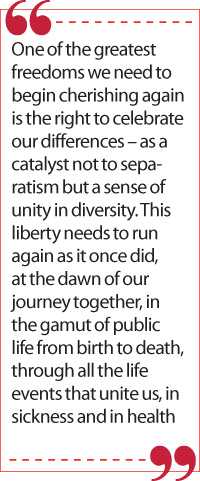Tuesday Feb 24, 2026
Tuesday Feb 24, 2026
Thursday, 4 February 2021 00:25 - - {{hitsCtrl.values.hits}}
|
Independence flagging
|
Sri Lanka was born free – of blood and bigotry – but everywhere is in chains. We found ourselves liberated from the shackles of colonialism some 73 years ago. It is a liberty we have squandered through licence to war on our fellow citizens, growing lawlessness amidst lip service being paid to discipline and virtue, and little if any care for posterity.
If we can’t see through the smokescreens of racism to perilous straits for reserves and paltry revenues to invest in education rather than ethno-nationalist jingoism, we all but deserve another loss of independence.
Those visions of splendour and prosperity which promised a sea-change for all of our citizens now seem reserved for an elect few chosen from amongst the privileged elites. Not even them, but merely a handful of members in a very select cabal or coven; and it shows though no one knows quite what to do about it, if indeed it is not to late already to stem the rotten tide...
This is no less true for those who voted unreservedly for the powers that be today, than it is for those who had and expressed strong reservations. I do not think we would blame the latter for saying ‘I told you so’ today. The writing had been on the wall ever since the early days of ‘good governance’ demonstrating that it too was culpable of negligence, mismanagement, and yes, even corruption.
 Successive governments have promised to bring culprits ranging from alleged war profiteers to suspected money-launderers to book, but so far it has – as always – been small fry in the net.
Successive governments have promised to bring culprits ranging from alleged war profiteers to suspected money-launderers to book, but so far it has – as always – been small fry in the net.
Rest assured it is not too early to essay the suspicion that the larger national project at hand has failed abysmally.
Respect – what little is left of it – stays the conclusion that the blame must be laid at the feet of one worthy or a host of satellite ‘sirs’. The very system that barely sustains is rotten to the core...
Really what matters more at this juncture (in fact, in the face of incontrovertible evidence that should the powers care, they could not show it less) is that any self-respecting people must begin to shoulder the responsibility for their fate rather than cuss politicians and other non-starters.
Rather than look to our elected representatives for solutions to our plethora of issues, we must look ahead and plant seeds for the future, in the perhaps vain hope that the biases and prejudices of a cynical and effete older generation of politicos will pass away...
So I come not to bury Caesar but to praise the natural resilience of the republic he and his cohorts would convert into a cruel, callous and chauvinistic empire. But it is a natural resilience that springs forth in times of dire crisis such as the immediate aftermath of the tsunami. Or the natural resilience that slowly and steadily becomes the national character over years of protracted and often brutal conflict and its attendant hardships.
And it is a resilience that dies an unnatural death as assertiveness yields to apathy, as we saw after the tsunami. And bravery bows before bloody-mindedness, as the sovereignty-saving efforts of the security forces are erased by the narrow partisan nationalism of non-patriots but that they trumpet it in their medals and uniforms and militarising programmes. And courage knuckles down under corruption and determination gives way to a long and quiet reign of desperation, where even the technocracy of so-called professionals is dust below the wheels of another juggernaut.
Freedom to
So it behoves us ordinary citizens once again, perhaps as never before on the cusp of consternation, to start challenging ourselves to be better than we are at present – in every respect.
One of the greatest freedoms we need to begin cherishing again is the right to celebrate our differences – as a catalyst not to separatism but a sense of unity in diversity. This liberty needs to run again as it once did, at the dawn of our journey together, in the gamut of public life from birth to death, through all the life events that unite us, in sickness and in health. The recent death of a medical professional at the front line of the fight against a viral enemy can better unite us than all the redesigning of national emblems or flying of out-of-place pennants.
Would that the chief executive of our commonwealth consider it that his primary duty, even over and above national security and the state of the economy, we would be off to a flying start in that regard?
Another liberty to be encouraged is the cheerful duty of all citizens to be disciplined – not only in the face of possible legal measures, but despite the prospect of punishment, and even as a remedy to creeping punitive militarisation that threatens our sense of common decency.
Do we not all remember or recall hearing it said that post-independence Ceylon was the envy of our sister states in the Commonwealth – not only because of our material prospects but also our manners and pleasant disposition?
Only those with a dim view of cultural anthropology, or a heart of darkness they scarcely sense in themselves, would insist on legislating morality or monitoring conduct to ensure high standards of civil behaviour through coercive means.
If it must be done, though, let it start among the uppermost echelons of the very legislature where it might yet be mooted, despite all the noises to the contrary. For ye gods and little fishes know they need it sorely more than any of us do. That sorry lot of MPs who don’t recognise the functions of furniture or the place of kitchen condiments, or the most salutary uses of water!
Does this sound as if we dare take a liberty with the solemnity traditionally associated with that erstwhile august assembly? Not at all!
There comes such a time when the hoi polloi, being in possession of more civility and courtesy than many if not most in that house, must be ready to rile or be defiant of anything that does not respect justice, a sense of fair play not overridden by parliamentary privilege, and our shared humanity, which should preclude the worst brought up among us from insulting another ‘member’ (no pun intended) of our society.
Freedom for
Such an attitude of critical engagement with our elected representatives would certainly go a long way towards ensuring a vital civil liberty we often take for granted. That is, to dream together with our so-called leaders how the national interest is best taken forward.
This, then, rather than let the nightmares of some ministering types rule our nation’s destiny by default, simply because we denied ourselves the freedom for space to envision our own fate...
For instance, how many of those who supposedly aspire to serve our country can place the sovereign nature of the state ahead of that of their own pockets, personalities and electoral ambitions? Has it ever crossed the mind of any of our MPs that we are on the cusp of a nasty new neo-colonialism if we don’t step smart and out of the yawning chasm of perilously partisan geopolitics?
What price a neutral state, whereby we move beyond the pitfalls of even non-alignment into the clearer waters of assured neutrality that better guarantees our ongoing sovereign independence? What is a neutral state, exactly, and how can the three arms of government working together give this safeguarding concept firmer ground to stand on, on the way forward? Or have we altogether abandoned hope in our legislature and judiciary?
There is also space for the freedom for excellence in our national mission. The tourism industry’s recent vector offers a classic example. Is it that the pilot project’s ostensible success in reintroducing visitors to our shores was a matrix of mafia tactics, a blind eye turned by bureaucrats on short cuts taken to the detriment of state and citizenry, as well as a risky venture that profited a few? Or can all the stakeholders in the enterprise chorus in one voice that the national interest alone and not that of parvenus or avant-garde entrepreneurs masquerading as the country’s saviours was served?
That is a question worth asking about every policy – from airports and ports to imports and exports – made and not made transparent or accountable enough in the public domain. It is a policy trajectory worth examining in every undertaking from divesting public enterprises to investing state-owned utilities in the burgeoning stock market, mirabile dictu!
Yet another freedom-for is the liberty to explore that old passion – a pluralistic socio-political ethos.
Yes, it’s time now! Because the majoritarian ethic has failed to deliver on the economy, is bungling pandemic management with punitive measures that have stigmatised sickness and driven the ailing underground while dragging their feet on securing sufficient stocks of a viable vaccine, and sent out mixed messages on managing national assets such as ports.
 Freedom from
Freedom from
Must we then hail from a minority community to speak out in order to secure freedom from the fear of death? In the face of national as well as international viral, medical and institutional expertise giving the green light for the burial of our COVID-19 dead, why do we persist in insisting on cremation? And do we, en masse, not see the dire consequences of allowing state actors to drive a chauvinist bias (one ethnicity preferred) from racist policy (that ethnicity privileged) to supremacist arrogance (other ethnicities prosecuted)?
The wrath of tyranny may regard so treacherous a plurality and equality as the voice of ‘treason’. But we suspect that if a tone-deaf and callously insulated administration persists in such folly, it will be at the expense of state security, country prospects and the national interest going forward.
The spectre of insecurity only recently threw a majority of Sri Lanka’s identity-enamoured people into the arms of a realpolitik-driven regime that would have been excused using fear of terrorism raising its ugly head again as an election strategy.
To pursue such a tactic when there is no tangible benefit to the incumbent government smacks of not the sublime vistas once envisioned but the ridiculous ultra-nationalist jingoism that courts conflicting nationalisms into a blood wedding.
Can we stop? Shall we all tread this primrose path to perdition with hardly a voice of protest raised except by an increasing isolated voice of reason? When will the madding crowd realise that the enemy of the state is not some insidious outsider or crouching invader, but our deeply entrenched apathy at the plight of the nation and its people that makes a hollow mockery of independence celebrations?
(Journalist | Editor-at-Large of LMD | Writer WFH)